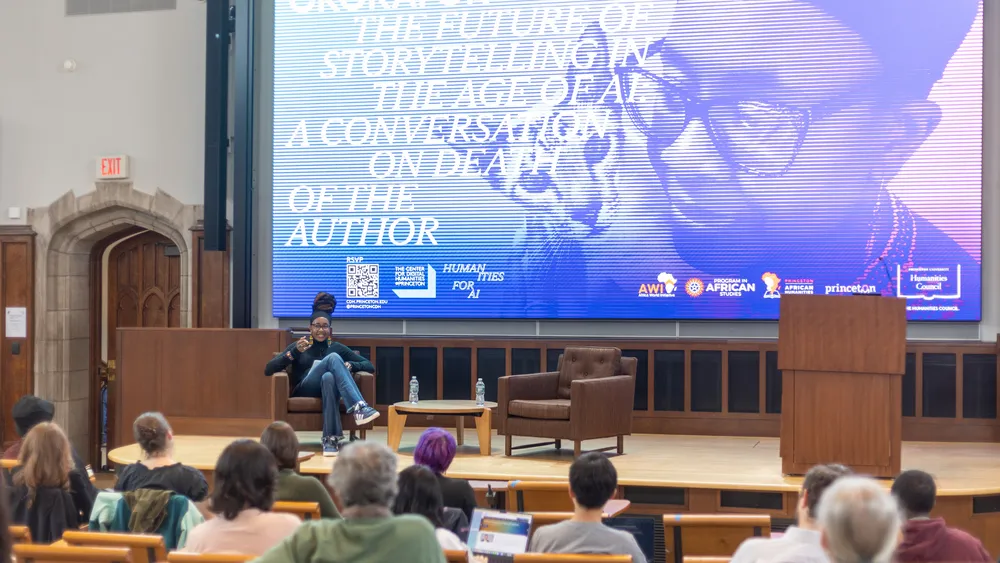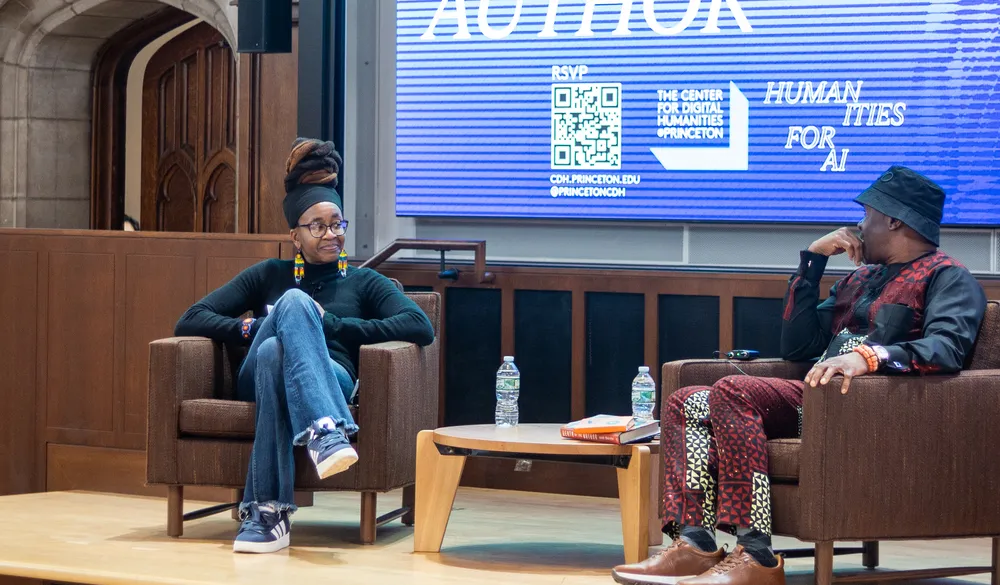The Future of Storytelling in the Age of AI: Q&A with Nnedi Okorafor
9 September 2025

Since fall 2024, the Center for Digital Humanities has led the “Humanities for AI” initiative through a series of events, projects, and conversations. We explore how humanistic values and approaches are crucial to developing, using, and interpreting the field of AI. As part of this effort, we publish a Q&A series with our guest speakers to further investigate perspectives on the impact of AI on humanities scholarship.
In April, we invited award-winning novelist Nnedi Okorafor to Princeton to discuss her new novel, Death of the Author, and the future of storytelling. In her “book-within-a-book,” a disabled Nigerian-American woman writes a successful sci-fi novel where “androids and AI wage war in the grown-over ruins of human civilization.”
During the conversation, Nnedi expressed hope that storytellers of all kinds understand the necessity of process, particularly experience as process, and are not “seduced” by the convenience of AI. Fascinated by tech and robots (she has several in her home!), and the ways they can help people with disabilities, she is optimistic that great stories will shine through the AI slop.
In your opinion, has speculative fiction influenced the rise of generative AI?
Absolutely. AI was imagined in science fiction (which is part of speculative fiction) narratives before it was created. First comes thought, then comes action. That’s not even my opinion, it’s fact.

Students pose for a photo with Nnedi Okorafor (at center) in the first year seminar Speculative Fiction: From Pygmalion to ChatGPT (FRS 142). (Photo: Carrie Ruddick)
You’ve described Africanfuturism as “skew[ing] optimistic.” What fuels that optimistic view for you?
That line is poking at the way Africa has been viewed from a Western perspective: as a place of poverty, disease, and war. The Africanfuturist perspective tends to be from the perspective of Africans, not the friends of or someone interested in Africa. The stories are mainly directly connected to those who have skin in the game.
Africanfuturism skews balanced, nuanced, from a place of knowledge and respect. It understands African culture, people, politics, the land, and futures as a whole. Africanfuturism doesn’t tend to romanticize Africa out of guilt or wallow in tragedy because such stories sell well in the West. Africanfuturism, whether it's a dark, bloody type of story or a whimsical, flowery type of story or whatever, mostly has Africa’s back because it is African.
What is your greatest concern for the future of AI for the humanities?
My greatest concern for AI is what’s already been happening. It’s that the models used to create it and train it contain the DNA of patriarchy. Patriarchy is about control, a need to be beholden to one’s creator, to be a reflection of its creator, and to be fed by its creator. Patriarchy has no respect for those it feels it dominates, hence the shameless theft of copyrighted works. All one needs to do is look at who created the technology. It didn’t have to be this way. Right now, AI software is not about making humanity greater or fixing tough problems; it’s about making money. All this will only lead in one direction.
What is your biggest hope for the future of AI for the humanities?
My biggest hope is that those who see these problems turn the ship in a better direction. Nothing is inevitable. We are in full control of how this goes. And not just the creators—the users, as well.

Nnedi and Chika Okeke-Agulu in conversation. April 2025. (Photo: Ali Nugent)
About Nnedi Okorafor
Nnedi Okorafor — the global leader of Africanfuturism, and an international literary superstar — is an award-winning novelist of science fiction, fantasy, and magical realism for adults and young readers. Among her many works are the Binti trilogy, the Akata Witch books (both optioned for the screen), and her latest, Death of the Author, which George R.R. Martin calls "[h]er best work yet... about fame, culture, the power of story, the writer’s life... and robots.” She is the author of Black Panther: Long Live the King, and she authored the spinoff graphic novel, Wakanda Forever, which became a Hollywood blockbuster. Okorafor is the winner of the Hugo, Nebula, World Fantasy, Locus, and Lodestar Awards. She holds a PhD in Literature, two Master’s Degrees (Journalism and Literature), and lives in Phoenix, Arizona, with her daughter Anyaugo.
The talk in April was supported by the Belknap Fund in the Humanities Council and co-sponsored by the Africa World Initiative, the Program in African Studies, the Princeton African Humanities Colloquium, and the Princeton Public Library.
Nnedi Okorafor: The Future of Storytelling in the Age of AI – A Conversation on Death of the Author

First-Year Students Explore AI Through the Lens of Speculative Fiction—Featuring Visits from Sci-Fi’s Literary Superstars
13 May 2025
Carrie Ruddick, Mary Naydan
